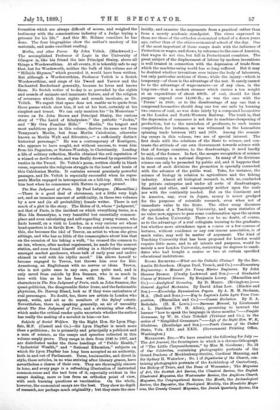Glasgow is, like his friend the late Principal Shairp, above
all things a Wordsworthian. At all events, it is tolerably safe to say that, but for Wordsworth, neither the bulk of this volume nor of "Hillside Rhymes," which preceded it, would have been written. But although a Wordsworthian, Professor Veitch is a Scotch Wordsworthian, and sings of his Tweed and Yarrow and the Enchanted Borderland generally, because he loves and knows them. No Scotch writer of to-day is so pervaded by the sights and sounds of animate and inanimate Nature, and of the religion of reverence which these sights and sounds inculcate, as Dr. Veitch. We regret that space does not enable us to quote from those poems which show him, if not at his best, certainly at his simplest and truest. We can only mention his "In Memoriam" verses on Dr. John Brown and Principal Shairp, the curious story of "The Laird of Schelynlaw," the pathetic "Jockie," and "My Own Familiar Hills." "Merlin," the longest and most ambitious piece in this volume, derives its name not from Tennyson's Merlin, but from Merlin Caledonius, otherwise known as Merlin Wylt and Silvestris,—" a sufficiently distinct historical personage." He was a contemporary of Kentigern, who appears to have sought, not without success, to wean him from his Paganism, or Nature-Worship, to Christianity. Leading a life of solitary reflection, Merlin obtained the evil reputation of a wizard or devil-worker, and was finally drowned by superstitious rustics in the Tweed. Dr. Veitch's poem, written chiefly in blank verse, represents the religious struggle in the heart and brain of this Caledonian Merlin. It contains several genuinely powerful passages, and Dr. Veitch is especially successful when he repre- sents Merlin engaged in introspection on a hill-top. Still, we like him best when he communes with Nature in propritt persond.


































 Previous page
Previous page